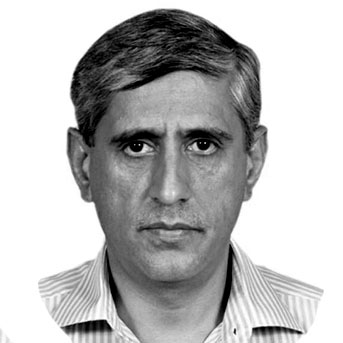Raashid Wali Janjua
SIR John Winthrop’s “City on the Hill” seems
more like a dystopian dream as Trump takes
world peace pell-mell in an inferno of war. Like a much revered Roman god of war Mars beating the drums of war to a frenetic pitch, he has provoked a hitherto fore circumspect Iran to revoke the landmark JCPOA nuclear deal. And therein lurks the greatest danger of a cataclysmic conflict with the USA. The assassination of Commander of Iranian Revolutionary Guards General Qasem Solaimani was deemed an act of war by the Iranians. The national mourning and remonstrance by Iranians presaged a violent denouement in the shape of another black swan act by either adversary. The unintended consequence however of the episode could be an escalation in the conflict that had lain in the low intensity mould till now, to an overt targeting of Iranian installations on mainland, by the vastly superior American air and space warfare means. The Iranian prompt response in retaliatory mode to slake their revenge thirst could have doused some of the flames of the impending conflict had it not been for the Iranian announcement to revoke the nuclear agreement that bound Iran to nuclear circumspection. That in fact could be the Rubicon Iranians had failed to appreciate not to cross. The escalation of the conflict could be avoided through multilateral diplomatic intervention of EU, Russia and China. What would not however be countenanced by the Americans would be an Iran achieving the bomb grade nuclear fuel enrichment capability.
What does it all portend for the world and the region including Pakistan? The world as we understand being divided in multiple centres of power still hearkens to the Walt and Mearsheimer’s critical enquiry of the post 2001 phase of the US foreign policy dominated by the geopolitics of anger. The fifth generation warfare is sometimes referred to the visceral and atavistic reversion to the wars of anger waged by the angry, driven by their ideologies or lack thereof a clear narrative. In many ways the geopolitics of hatred are the antithesis of geo -economics of cooperation. The nihilistic tribalism that preceded the Post Westphalian world seems to have staged a comeback, riding the crest of a post-modernistage where grand narratives and certitudes have been replaced by the doubt, hatred and confusion. From half a century of Kantian interlude of bipolar world to the brief interregnum of unipolarity the world has gone the way of Hobbesian anarchy where power and the anger rule. As per Walt and Mearsheimer, the United States is driven by lobbies having world views rooted in anger and hateful ideologies. Iran represents the stumbling block to the US ambitions of acting as the Gendarme of the Middle East in order to dominate the economic lifelines of her main rival i.e China. The regional surrogates of respective global powers are also caught up in their little games aping the behaviour of their principals. India in South Asia, Israel in the Middle East, Japan in the Pacific and Vietnam in South-East Asia are emerging as powers aligned on the US side while Turkey, Iran and Pakistan are trying their best through external balancing to ward off the challenges to their regional and global relevance. In this complicated mosaic the entry of a deus ex machina like Trump has added an element of unpredictability and danger for regional and global peace.
The unilateral renunciation of Joint Comprehensive Plan of Action by the USA in 2018 was like a red rag to a bull of Iranian nuclear ambition. The painstakingly crafted JCPOA by EU and P5 plus one that essentially kept a lid on the Iranian nuclear ambitions according to many nuclear experts was the best bet for the US and her allies that were scared of the Iranian asymmetric threats. Under JCPOA, Iran agreed to eliminate its stockpile of medium-enriched uranium, cut its stockpile of low-enriched uranium by 98%, and reduce by about two-thirds the number of its gas centrifuges for 13 years. For the next 15 years Iran was supposed to enrich uranium up to 3.67% only. Iran also agreed not to build any new heavy-water facilities for the same period of time. Uranium-enrichment activities were also supposed to be limited to a single facility using first-generation centrifuges for 10 years. With total domination of aerospace and nuclear warfare the US ambitions appear unbounded by any rationality displaying the quintessential malady of geopolitics of anger. The assassination of General Solaimani was an act begotten of hubris and anger, a lethal concoction by any standards. The most dangerous portents of the tension spiraling into a devastating war stem from Iranian decision to revoke the nuclear agreement. The only silver lining in the whole episode is the Iranian offer to the USA to rejoin the JCPOA for burying the hatchet. Iran’s rival Arab monarchies and Israel would not mind a US attack on Iran. It is for Iran and USA however to understand that a war between the two would bring untold misery to both the nations. The countries worst affected from a US-Iran war would be India, China, Pakistan, Japan and EU due to their dependence on gulf energy supplies. The onus for burying the hatchet therefore lies on above powers which instead of playing surrogates should unite to act as dampeners on the geopolitics of anger in the Middle East.
—The writer is a PhD scholar at NUST.
— The writer, a Retired Brig, is a PhD scholar at NUST, Islamabad.










